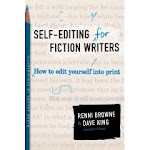There’s a scientific reason for that roadblock. The creative act of writing your first draft stems from the right side—or creative side—of the brain. Later in the process, when polishing begins, the left side takes over. Here are some of the characteristics of each side.
Right Brain
- Visual in process, focusing more on patterns and images
- Generally intuitive, led by feelings
- Is the epitome of multi-tasking, able to process ideas simultaneously
- Progresses from the big picture to the details
- Lacks organization, utilizes free association
- More verbal, needs to find specific words to express ideas
- Analytical, led by logic
- Takes things step by step, one idea at a time
- Organizes details first before moving to the big picture
- Very organized, utilizing lists and detailed plans
- Don’t give in to temptation. Our Inner Editor gets stronger the more frequently we give in to her demands. If she thinks you need a certain word before you can finish that sentence, stay strong. Type XXX and go on. Later, during the rewriting process, you’ll have plenty of time to find the right word. This goes for anything that demands you slow the creative process. At this point in your manuscript speed is your best friend.
- Set a daily and weekly word count goal. This can often sidetrack the Inner Editor because of her need to meet a goal. Sometimes, in her drive to succeed she can even become an ally.
- Make lists in a separate notebook. Use your computer for the story, but if the need for details overshadows the creative urge, make a quick note in a notebook. Don’t let yourself get bogged down, but let the free association part of your right brain give you ideas to explore later with your more logical left side.
- Don’t give in to fear. Many times our Inner Editor is driven by fear. Fear that this draft isn’t good, won’t work or just doesn’t make sense. Remind yourself that this version isn’t written in stone. Sometimes just giving ourselves permission to write what Ann Lamott calls the sh*%&# first draft is all we need to derail our Inner Editor.












Edie, Thank you so much for posting this! My inner editor tends to be fear driven...that my words won't be good enough or makes no sense at all. I like the idea of just getting that first draft done and going back to it later.
ReplyDeleteI don't have any tips to add, but I will certainly be applying the ones I just read.
Thanks, Alycia. Every writer I've spoken to, no matter how many books they've written, fight fear. It seems to go hand in hand with the gift of words.
ReplyDeleteThis is so on target. If I have one word of wisdom to share, it's this: Trust the Process!
ReplyDeleteI write my rough draft straight through without stopping for any revisions (I put questions in footnotes).
And over and over again I discover that rough draft isn't nearly as bad as I was afraid when I was writing it. I'm about to start major revisions to my next book, due on August 1st. Yes, there are inconsistences and time problems and you name it. But those are cosmetic changes. The manuscript is solid, a good piece of work. And the more I write, the better that first draft gets.
Fear? I'm speaking here as a multi-published author. I KNOW I can write Heartsong books and novellas, and do them well. Writing longer books, books to sit beside the likes of Kim Vogel Sawyer--now, that terrifies me. Because I know it will take something more than what I do now. And can I do it?
So ... one kind of fear gets replaced with another. All the way up to those rare millionaire authors.
I have the same kind of fear where I think that first draft of mine really stinks. But like you, Darlene, when I go back to it, it's not as bad as I thought.
ReplyDeleteEdie, it's funny that you suggest writing XXX when you can't think of just the right word. I do that all the time! LOL
I really don't have any new tips. I do what Darlene does, by slipping notes to myself under comments, etc. I also suggest having a thesaurus handy to put in the right word when you do finally go back to all those XXX's.
I think you covered it all, Edie. I can't think of anything to add. Maybe someone else will.
Great post!
Okay, Edie, I know this post was for me. (And you know it was, too!) My inner editor is always on the job, constantly stopping me and convincing me that if I don't fix it now, it'll somehow slip through the cracks and end up in print. Now how ridiculous is that? Thank you for the reminder...again...
ReplyDelete[First time post here for me] Ahhhh thank you for posting this! My inner editor pretty much stalls my writing completely. I start writing, I get on a roll, and I'm continuously looking backwards to fix this or fix that. I can never seem to move forward. I have several started novels but I've never finished any of them because I'm too busy going back and fixing and re-writing and editing. It just stops me completely. On the other hand, I'm always having people ask me to edit/critique their writing, which is something I love to do too.
ReplyDeleteI have a love/hate relationship with my inner editor. Sigh.
I will try some of these suggestions - thank you!
Welcome Karin! I'm glad you shared your insight. My Inner Editor is actually who started me on the road to editing. I'm like you, I enjoy that part of the process too. But I've had to learn when to write freely and when to edit. Knowing that has made me a better writer and editor. Blessings on your journey!
ReplyDeleteWhat an eye opener! My inner editor and I have an uneasy peace but it never occurred to me that a big part of it is my strict word count rule. That really does appease her and, if my right brain is feeling wonky, my editor will crack that whip. 1000 words is a 1000, not 995! And of course the old XXX trick gives her something to chew on while the rest of us are writing. Great post!
ReplyDeleteThanks, Edie! This is completely applicable for non-fiction as well. I didn't realize my inner editor has greatly hampered my book writing by always questioning if this will really be part of the book, or how this will fit - rather than just typing away as the unction flows, and doing all the placing and editing and deleting later.
ReplyDeleteAs I press forward now, telling that inner editor to give up, I find the Lord doing a healing work in me as I let myself type about some of the issues surrounding my story that will probably never make it to print - and probably are never supposed to. They do, however, need to be dealt with so the writing comes without the poison.
Thanks for making this so clear.